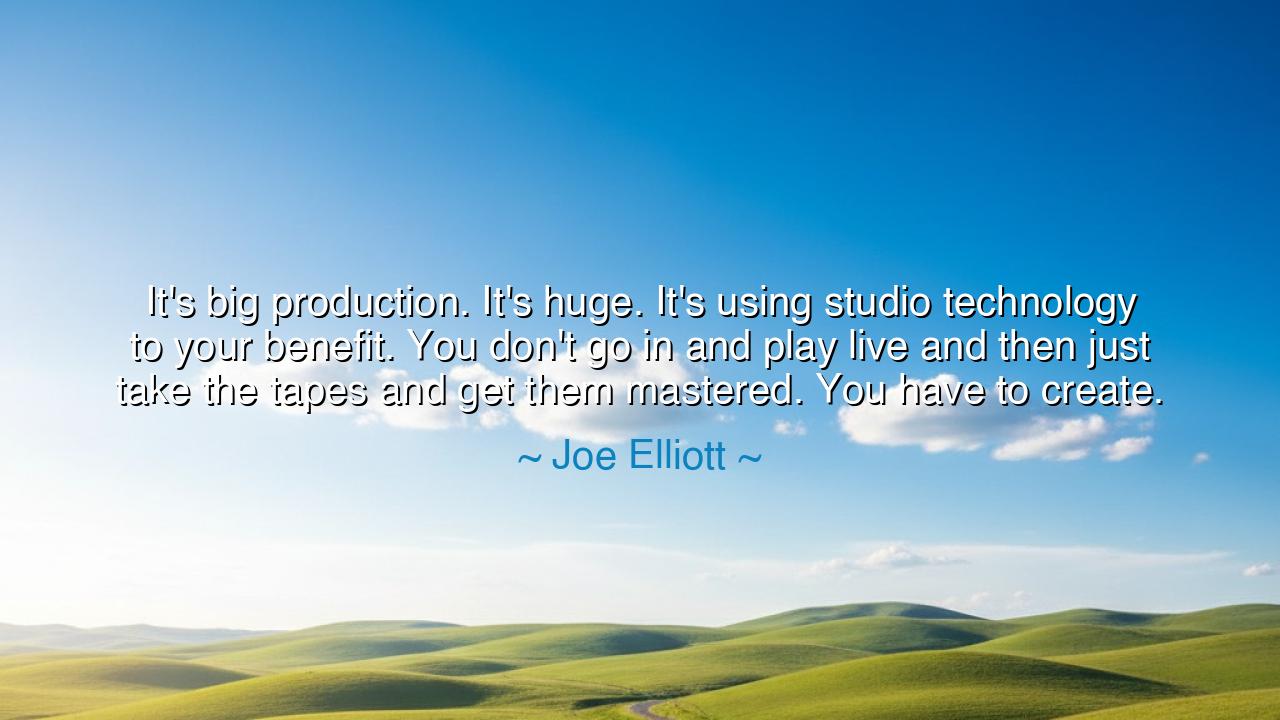
It's big production. It's huge. It's using studio technology to
It's big production. It's huge. It's using studio technology to your benefit. You don't go in and play live and then just take the tapes and get them mastered. You have to create.






The words of Joe Elliott, “It’s big production. It’s huge. It’s using studio technology to your benefit. You don’t go in and play live and then just take the tapes and get them mastered. You have to create,” speak as both a declaration of craft and a philosophy of artistry. Elliott, the voice of Def Leppard, was born into an era when rock music was transformed by the rise of the recording studio as an instrument in itself. His words remind us that true creation is not simply the capture of what already exists, but the shaping, layering, and envisioning of something beyond the raw moment. The studio becomes not merely a place of recording, but a temple of creation.
The origin of his statement lies in the age of the 1980s, when Def Leppard was forging albums like Pyromania and Hysteria, works that were not only songs but monuments of production. With producer Robert John “Mutt” Lange, the band spent months, even years, refining each note, layering countless vocal tracks, polishing each guitar line until it became something larger than life. Elliott’s words testify to the belief that studio technology is not a crutch, but a palette, allowing artists to paint with sounds impossible to achieve in a single live take. This was not the betrayal of music’s soul, but the expansion of its boundaries.
History gives us other voices who walked this path. Consider The Beatles, who began as a live band but, under George Martin’s guidance, transformed into pioneers of the studio. Albums like Sgt. Pepper’s Lonely Hearts Club Band could never have been performed live at the time; they were born from studio invention, from tape loops, overdubs, and multitrack experimentation. The Beatles did not merely record songs; they created worlds of sound. Elliott’s words stand in this same lineage: the call to embrace the studio not as a mirror but as a forge.
The deeper meaning of his teaching is that art demands imagination beyond mere replication. To record live and simply master it is to preserve what already exists. But to harness the studio is to elevate it, to push music into forms never heard before. This is the difference between documentation and creation: one captures, the other transforms. Elliott exhorts us to remember that the true artist does not settle for echoing reality but dares to invent new realities.
There is also a universal lesson hidden here. The studio is not only a literal place but a metaphor for every field of work and creation. In life, we may simply record what we do, repeating habits and routines, content to preserve what is already there. Or we may create—refining, reshaping, and daring to use the tools at our disposal to turn the ordinary into the extraordinary. Just as the musician does not stop at the raw tape, so too must we not stop at mere existence, but strive to craft our lives with intention and artistry.
For those who live in this age, the action is clear: when given tools, do not use them minimally—use them creatively. Whether with technology, with words, with relationships, or with dreams, do not settle for what is easy. Layer, refine, polish, and imagine until your work carries the weight of greatness. To create is to honor the gifts of time and opportunity; to merely capture is to leave potential unrealized.
So let this wisdom be remembered: the call of the artist, and of every human soul, is not only to perform, but to create. As Joe Elliott declares, the greatness of production is not in its size alone, but in the courage to use technology as a servant of imagination. Do not be content with raw notes or first drafts. Shape them, layer them, build them until they echo larger than life. For in this work of creation lies not only art, but the very power of humanity—to make something that never was before, and to give it as a gift to the world.






AAdministratorAdministrator
Welcome, honored guests. Please leave a comment, we will respond soon